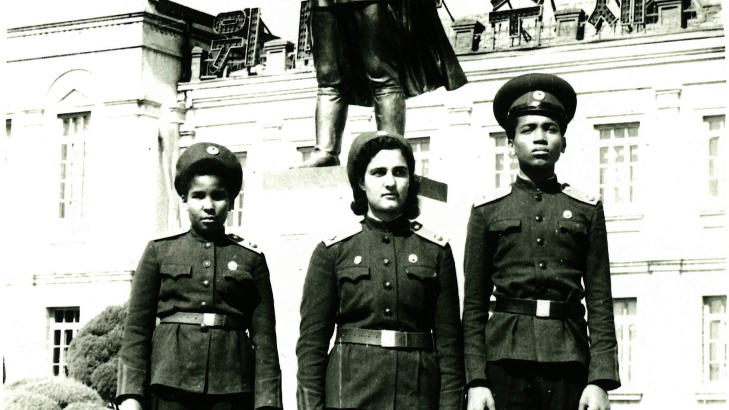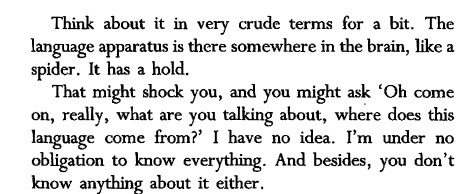thsi owns. all the comments shriek about how her dad was a crazy murderous tyrant in equatorial guinea but i bet it's like 80% fabricated by anticommunists


A cool collection of articles on "human rights" as propaganda and U.S. efforts towards regime change in NK. The one about the National Endowment for Democracy might interest people here. Just found this and read them.


djbk posted:fuck paul carr
babyhueypnewton posted:dunno who wrote this script this year but it's a pretty good piece of propaganda.
well, it is the 100th anniversary.
also lmao i was looking at the war nerds twitter and he retweets wet butt
stegosaurus posted:also lmao i was looking at the war nerds twitter and he retweets wet butt
there's a lot of cross over between ex-FYADs and american journalists and writers these days.
getfiscal posted:today i read a book where hobsbawm interviews a leader of the italian communist party in 1977. this was basically the peak of their post-war power i guess. it was also the period where they and a lot of other parties took clear positions on the 'democratic road to socialism' or whatever. you get a sense from the book how reformist they clearly are. (since then they fully revised themselves into a social-democratic alliance party)
Do you think this is came from an inherent flaw in Gramsci's thought, a misinterpretation by revisionists, or the result of the material conditions of labor aristocracy in the Italian Union movement regardless of ideology? It bothers me that revolutionary theorists like Gramsci and Althusser have left nothing but revisionists in their wake.
Sources of the Self by Charles Taylor
A Secular Age by Charles Taylor
Imagined Communities by Benedict Anderson
Charles Taylor is pretty cool. Also got a gift card and ordered:
The Interpretation of Culture by Clifford Geertz
The Elementary Forms of Religious Life by Durkheim
http://en.wikipedia.org/wiki/Mai,_the_Psychic_Girl
babyhueypnewton posted:Do you think this is came from an inherent flaw in Gramsci's thought, a misinterpretation by revisionists, or the result of the material conditions of labor aristocracy in the Italian Union movement regardless of ideology? It bothers me that revolutionary theorists like Gramsci and Althusser have left nothing but revisionists in their wake.
i'm not sure. i don't think gramsci himself is responsible really. i think a lot of it comes from the experience of fascism in france, italy and spain. in france and italy there was a conscious decision to build "one state" rather than try to overthrow the new bourgeois republics. this was because they thought there was little appetite to move from world war to civil war, and because the aims of reconstruction were shared by the broad majority. there was also an aim to revolutionize the culture, insofar as they wanted their countries to reject the fascist heritage. once they accepted the "one state" paradigm (which they did in the 1940s even really) then it became a matter of coalition-building and such. part of this was the reality of bloc politics, as in the soviet union wanted to avoid open war in europe. there was also the fact that western europe, with some ups and downs, was prosperous over much of this period, and the parties adapted to treating labour as an interest group. it all seems completely "reasonable" except for the fact that it obviously forgets class struggle and therefore takes on a bourgeois outlook.
i think an important point is that none of this is wrong from some cosmic perspective or something, like, if the PCI (or SACP) really did produce great revolutionary results with their line then that's great. the fact is that they stalled and reversed. and it appears the countries that went the furthest with socialism were the ones that systematically tried to suppress the bourgeoisie, rather than accommodate it.
babyhueypnewton posted:DM I've never heard of Charles Taylor so I briefly looked him up. What is he doing that isn't already done by Carl Schmitt or Georgio Agamben?
I haven't read Schmitt or Agamben firsthand yet and I'm only just now getting into Taylor so I can't give you a really comprehensive answer yet. What similarities did you have in mind?
getfiscal posted:like, if the PCI (or SACP) really did produce great revolutionary results with their line then that's great. the fact is that they stalled and reversed. and it appears the countries that went the furthest with socialism were the ones that systematically tried to suppress the bourgeoisie, rather than accommodate it.
history exonerates comrade bordiga
babyhueypnewton posted:DM I've never heard of Charles Taylor so I briefly looked him up. What is he doing that isn't already done by Carl Schmitt or Georgio Agamben?
friends with ramsey clark and trained by gaddafi
getfiscal posted:the result was that socialists came to power basically anywhere the US/UK didn't have troops (usually through electoral coalitions that were then dissolved into people's democracies).
yup
the best part of kristeva's lectures were her discussion of an analytic case and how analysis works. the part about religion was only interesting insofar as she sketched out how christianity anticipates many of the positions of analysis.
macpherson's lectures on democracy (from 1965) were useful insofar as he shows that socialist democracies and newly independent countries were both democratic in a broad sense, and would probably become moreso over time. he overestimated the short term gains of socialism though, and was an idealist so he talked about how the west should give massive aid to the poor of the world. macpherson always stubbornly said he never studied marx in detail, but he was a keen observer and came to many of the same conclusions.
blinkandwheeze posted:getfiscal posted:like, if the PCI (or SACP) really did produce great revolutionary results with their line then that's great. the fact is that they stalled and reversed. and it appears the countries that went the furthest with socialism were the ones that systematically tried to suppress the bourgeoisie, rather than accommodate it.
history exonerates comrade bordiga
i've never actually read bordiga. i always thought it was weird he died in 1970 though. that's like how kautsky died in 1938. whenever i read about kautsky's theories i always assume lenin literally killed him in 1919 or something.
